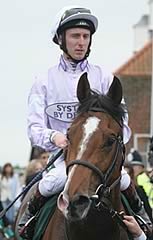 |
|
|
|
| Vodafone Epsom Derby - 2nd June 2007 |
![]()
|
[an error occurred while processing this directive] 50 Vodafone Derby Facts
2. Arthur Budgett trained four Derby runners, two of whom he owned - Blakeney,
successful in 1969, and Morston the winner in 1973. For good measure, Budgett
also bred the two half-brothers, making him only the second man to have owned,
bred and trained two Derby winners - the first being William I'Anson who won
the Classic with Blink Bonny in 1857 and Blair Athol in 1864. 3. Lammtarra, the 1995 Vodafone Derby victor, was the first horse to win
the premier Classic on his seasonal debut since Grand Parade in 1919. Amazingly,
Shaamit achieved the same feat a year later.
4. Lammtarra recorded the fastest time in the 227-year history of the Derby.
His time of 2 minutes 32.31 seconds was over a second faster than the previous
Derby record of 2 minutes 33.8 seconds, clocked by Mahmoud in 1936. The 2001
winner Galileo recorded the second fastest Derby time, coming home in 2 minutes
33.27 seconds, while another fast time of 2 minutes 33.35s was recorded by
Kris Kin in 2003. Last year’s winner Sir
Percy recorded 2 minutes 35.23
seconds. 5. The three longest-priced Derby winners, all at 100/1, were Jeddah in 1898,
Signorinetta in 1908 and Aboyeur in 1913. In more recent years, the two biggest
outsiders to have won the Classic were Psidium at 66/1 in 1961 and Snow Knight
at 50/1 in 1974. 6. The longest-priced placed horse in the Vodafone Derby was the Clive Brittain-trained
Terimon, who finished second to Nashwan in 1989 at odds of 500/1. 7. Steve Cauthen became the first victorious American-born jockey for 65
years when winning the 1985 Derby on Slip Anchor. Cauthen, who won the Derby
again in 1987 on Reference Point, was also the first jockey to ride the winner
of both the Kentucky Derby and the Vodafone Derby. Cauthen had won the American
Triple Crown, of which the first leg is the Kentucky Derby, on Affirmed in
1978, when just 18. In 1986 the stallion Nijinsky, one of the greatest Derby
winners, achieved a similar feat to Cauthen by siring Ferdinand, the Kentucky
Derby winner, and Shahrastani, the winner at Epsom. 8. The largest Derby field was 34 in 1862, and the smallest was just four
in 1794. There is now a safety limit of 20 for the Vodafone Derby. 9. Vincent O'Brien, now 90 years old, is the only living person to have trained
winners of the Derby, Grand National and Cheltenham Gold Cup. Larkspur in
1962 was the first of six Derby winners for O'Brien, who won the Grand National
three times and the Cheltenham Gold Cup four times. See 14 for more O’Brien
information. 10. Aidan O’Brien achieved the amazing feat of saddling the first two
home in the 2002 Vodafone Derby, High Chaparral and Hawk Wing. The previous
trainer to send out the 1-2 in the Derby was Richard Carver, with My Love
and Royal Drake in 1948 - it was the 64-year-old Carver's first visit to Epsom. 11. Several Derby runners have later excelled over jumps. Sea Pigeon, who finished seventh to Morston in 1973, went on to win two Champion Hurdles. Lester Piggott came 15th on Prince Charlemagne in the 1953 Derby and then rode the same horse to victory in the Triumph Hurdle nine months later. Wellbeing, who finished fifth to Sinndar in the 2000 Vodafone Derby, was the impressive winner of a valuable handicap hurdle at Aintree in 2006. Mountain, eight in the 2006 Vodafone Derby, won a Sandown novice hurdle in February on his jumping debut.
12. Four grey horses have won the Derby: Gustavus in 1821, Tagalie in 1912,
Mahmoud in 1936 and Airborne in 1946. Terimon, second in 1989, and Silver
Patriarch, runner-up in 1997, were the last greys to be placed. 13. There is usually a strong overseas challenge in the Vodafone Derby, particularly
from Ireland and France. The Irish have won the Classic for three of the past
seven years with Sinndar, Galileo and High Chaparral, following something
of a drought as before them the last Irish winner was the David O'Brien-trained
Secreto in 1984. The last French-trained winner was Empery in 1976. In the
1977 Derby, won by The Minstrel, six of the first seven home were either trained
in Ireland or France. 14. In total there have been eight Derby winners trained at the famous Ballydoyle
yard in Co Tipperary, Ireland. High Chaparral in 2002 and Galileo in 2001,
both trained by the present master of Ballydoyle Aidan O’Brien, joined
the six winners trained at the yard by the great Vincent O’Brien - Larkspur
(1962), Sir Ivor (1968), Nijinsky (1970), Roberto (1972), The Minstrel (1977)
and Golden Fleece (1982). 15. In 1992 Dr Devious became the first Vodafone Derby winner to have earlier
run in the Kentucky Derby. The Clive Brittain-trained Bold Arrangement, who
finished second in the American Classic at Churchill Downs in 1986, was the
first horse to run in both races although he fared less well at Epsom, coming
home 14th of the 17 runners. 16. Craganour in 1913 remains the only Derby winner to have been disqualified
for an incident in the race, when the Classic was awarded to Aboyeur. That
Derby was one of the most dramatic of all time as the suffragette Emily Davison
was killed after running in front of King George V's horse Anmer at Tattenham
Corner. 17. The great but ill-fated Shergar recorded the widest winning margin in
the history of the Derby, taking the Classic by 10 lengths in 1981. 18. Several horses have won by the smallest margin, a short-head, the last
being Sir Percy in 2006. There have also been two dead-heats in the history
of the Derby. In 1884 St Gatien and Harvester shared the prize. The Colonel
and Cadland originally dead-heated in 1828 but a re-match later in the afternoon
went to the latter horse. 19. The oldest winning jockey was John Forth on Frederick in 1829, who was
at least 60 at the time. Scobie Breasley, who died at the age of 92 in 2006,
was 52 when successful on Charlottown in 1966. The youngest is believed to
be John Parsons, reported to have been just 16 when riding Caractacus to victory
in 1862. 20. The youngest winning jockey in the 20th century was Lester Piggott, aged
18 when successful on the 33/1 chance Never Say Die in 1954. 21. Lester Piggott, who announced his retirement from the saddle in 1995,
rode in the Derby 36 times and partnered an unequalled nine winners of the
premier Classic, the last of whom was Teenoso in 1983. He rode in the race
in five different decades, having his final ride when 58 in 1994. Piggott’s
association with the Derby lives on as Shaamit, the 1996 winner, was trained
by William Haggas, his son-in-law. The previous record number of Derby winners
for a jockey was six, achieved by both Jem Robinson and Steve Donoghue. 22. The 1909 Derby created history being the first, and so far only time,
that the reigning monarch has owned the Derby winner. Minoru was owned by
King Edward VII, who died the following year. He had also won the Derby with
Persimmon in 1896 and Diamond Jubilee in 1900 when Prince of Wales. George
IV won with Sir Thomas in 1788, when still Prince of Wales. The present Queen
has owned a winner of every other British Classic but is still waiting for
her first success in Britain's premier race. She came closest with Aureole,
who was second to Pinza in the Coronation year of 1953. Church Parade, who
finished fifth behind Shergar in 1981, was her latest Derby runner. 23. Six fillies have won the Derby, the last of whom was Fifinella in 1916 who also won the Oaks at the same meeting when the race was run at Newmarket due to the First World War. Very few fillies now run in the Derby and the last to be placed was Nobiliary, second to Grundy in 1975. Cape Verdi attempted to follow up her 1,000 Guineas success in the 1998 Vodafone Derby and started 11/4 favourite, but could only finish ninth. 24. The last maiden to win the Derby was Merry Hampton in 1887, who had never
previously run before. Despite having no form, the bookmakers were obviously
aware of the horse's ability as his starting price was only 100/9, about 11/1
today. Amato, the 30/1 winner in 1838, never raced before or after his Epsom
triumph. The 2006 runner-up, Dragon Dancer, was also a maiden. 25. Quest For Fame's victory in 1990 meant that there are now only three letters of the alphabet with which a Derby winner's name has not begun. Quest For Fame was the first Q but there have so far been no Derby winners with the initials U, X and Z.
26. Lady James Douglas became the first woman to own a Derby winner when Gainsborough won the Classic in 1918 at Newmarket. There have still been no Derby winners either trained or ridden by women. Alex Greaves, who rode 500/1 shot Portuguese Lil in 1996, became the first and to date only woman to ride in the Derby - she finished last. Criquette Head-Maarek is the latest woman to train a runner - American Post who came sixth in 2004.
27. Three trainers each trained a record seven Derby winners - Robert Robson, John Porter and Fred Darling. Following Vincent O'Brien's retirement in 1994, the record among current trainers is four, achieved by both Henry Cecil (Slip Anchor in 1985, Reference Point in 1987, Commander In Chief in 1993, Oath in 1999) and Sir Michael Stoute (Shergar in 1981, Shahrastani in 1986, Kris Kin in 2003 and North Light in 2004).
28. Geoff Wragg is another trainer with an excellent strike-rate in the Vodafone
Derby. Four of his six runners have finished in the first four and Wragg won
the race with his first runner, Teenoso, in 1983. Most Welcome was runner-up
to Reference Point in 1987 and Red Glow finished fourth a year later. Gulland
let the side down when only 11th in 1998, St Expedit was seventh in 2000 and
in 2006 Dragon Dancer only found Sir Percy a short-head too good. 29. Geoff Wragg's father Harry, nicknamed the ‘Head Waiter’ because
of his famed waiting tactics when riding, was the last person to have both
trained and ridden a Derby winner. Harry Wragg rode Felstead to victory in
1928 but waited until 1961 to train Psidium to win at Epsom. 30. In 1995, the Derby was run on a Saturday for the first time since 1953. 31. Lord Rosebery is the only person to have owned the Derby winner while
Prime Minister. He won the Classic both in 1894 with Ladas and the following
year with Sir Visto. 32. Lord Rosebery's 1894 winner Ladas started at 2/9, still the shortest-priced Derby winner. The most recent odds-on winner was Shergar at 10/11 in 1981 and the most recent odds-on loser was Entrepreneur, who could finish only fourth behind Benny The Dip when starting at 4/6 in 1997.
33. The Derby is usually won by a fancied horse and in the past 41 runnings
the race has gone to the first or second favourite 27 times. 34. Sir Gordon Richards, the most successful British jockey of all time,
did not win the Derby until 1953, the last of his 28 rides in the premier
Classic. Richards rode Pinza to victory shortly after being knighted in the
Coronation honours, beating the Queen's colt Aureole into second place at
Epsom. 35. The Derby, first run in 1780, took place over a mile until 1784 when
the race was extended to the current distance of one and a half miles. The
present Derby course was first used in 1872. The Classic was run at Newmarket
from 1915-18 and from 1940-45 during the two World Wars. 36. Two of the last 22 Derby winners now stand at stud in Japan - Commander
In Chief (1993) and Lammtarra (1995). One is in Australia - Quest For Fame
(1990), four are in Ireland - High-Rise (1998, who had been in Japan), Galileo
(2001), High Chaparral (2002) and Kris Kin (2003). Kahyasi (1988) and Sinndar
(2000) are in France, while Dr Devious (1992, who stood in Japan), is now
based in Italy and Oath (1999) is in India. Generous (1991, who had been in
Japan), Erhaab (1994, who had been in Japan), Slip Anchor (1985), Shahrastani
(1986) and Motivator (2005) stand in Britain. The 2004 hero North Light stands
in Kentucky, USA. The 2006 hero, Sir Percy, is still in training. 37. Despite of all his outstanding success at stud, it was only in 2001 that
14-time champion sire Sadler’s Wells had his first Derby winner with
Galileo. He doubled up when High Chaparral scored 12 months later. 38. The Derby gained its name after the 12th Earl of Derby and Sir Charles
Bunbury tossed a coin to decide after whom the Classic would be titled. 39. In 1844, "Running Rein" finished first past the post but the
horse was soon disqualified when it was discovered that he was really a four-year-old
called Maccabeus. The prize was awarded to Orlando. 40. Humorist died from a tubercular lung infection two weeks after winning
the 1921 Derby. 41. The Derby became the first horse race to be filmed in 1895 and the first
horse race to be televised in 1932. The initial radio coverage of the Derby
was in 1927. 42. The 1949 Derby was the first to be decided by a photo-finish camera.
43. Starting stalls were used for the Derby for the first time in 1967. 44. In 1801 Eleanor, owned by Sir Charles Bunbury, became the first filly
to win both the Derby and the Oaks. 45. The first French bred winner of the Derby was Gladiateur in 1865, partnered
by Harry Grimshaw, while Iroquois became the first American-owned and bred
Derby winner in 1881, ridden to victory by Fred Archer. 46. The earliest-foaled Derby winner on record this century was Captain Cuttle,
the 1922 victor who was born January 11, while the latest was the May 25-foaled
Pont L’Eveque, successful in 1940. 47. Jockey Harry Barker recorded the amazing feat of finishing second in both the Derby and the Grand National in 1893. He rode Ravensbury at Epsom Downs and Aesop at Aintree.
48. In 2001, the winners of the Oaks and the Derby, Imagine and Galileo,
were both trained by Aidan O’Brien and ridden by Michael Kinane. Both
horses were owned partly by Sue Magnier - Galileo was also partly owned by
Michael Tabor while Diane Nagle had a share in Imagine. Prior to this, the
last time the same jockey, trainer and owner won the Oaks and Derby in the
same year was in 1950. Rae Johnstone, Charles-Henri Semblat and Marcel Boussac,
respectively rode, trained and owned that year’s Derby winner Galcador
and Oaks victor Asmena. 49. Sir Michael Stoute in 2004 became only the 16th trainer to win the Derby
in two consecutive years, a feat previously achieved by Frank Neale (1782/1783),
Richard Prince (1795/1796), Robert Robson (1809/1810), James Edwards (1824/1825),
John Scott (1842/1843 and 1852/1853), George Manning (1858 /1859), John Porter
(1882/1883 and 1890/1891), George Dawson (1888/1889), Matthew Dawson (1894/1895),
Alec Taylor (1917/1918), Fred Darling (1925/1926 and 1940/1941), Richard Dawson
(1929/1930), Frank Butters (1935/1936), Dick Hern (1979/1980) and Aidan O’Brien
(2001/2002). But no trainer has ever won the Classic for three consecutive
years, although Aidan O’Brien went close when The Great Gatsby was runner-up
in 2003. 50. A select band of five trainers have managed to win Britain’s two most famous races - the Grand National and the Vodafone Derby. They are George Blackwell (Grand National: 1923 Sergeant Murphy; Derby: 1903 Rock Sand), Richard Dawson (Grand National: 1898 Droghead; Derby: 1916 Fifinella, 1929 Trigo, 1930 Blenheim), James Jewitt (Grand National: 1876 Regal; Derby: 1884 Harvester, 1892 Sir Hugo), Vincent O’Brien (Grand National: 1953 Early Mist, 1954 Royal Tan, 1955 Quare Times; Derby: 1962 Larkspur, 1968 Sir Ivor, 1970 Nijinsky, 1972 Roberto, 1977 The Minstrel, 1982 Golden Fleece) and Willie Stephenson (Grand National: 1959 Oxo; Derby: 1951 Arctic Prince). Among current trainers, David Elsworth, who saddled the 1988 Grand National winner Rhyme ‘N’ Reason, sent out Mighty Flutter to finish third in the 1984 Vodafone Derby, while his Norse Dancer was fourth at Epsom Downs in 2003, Salford City was fifth a year later, The Geezer was eighth in 2005 and Snoqualmie Boy was 16th last year. |




 1. In the past 37 years only one trainer has a 100 per cent record in the
Vodafone Derby - William Haggas, whose Shaamit won the 1996 renewal. Irish
handler John Oxx sent out his first runner, Sinndar, to win in 2000 while
in 2003 he trained the third horse home, Alamshar. French-based John Hammond
had the second, Walk In The Park, in 2005 with his first runner.
1. In the past 37 years only one trainer has a 100 per cent record in the
Vodafone Derby - William Haggas, whose Shaamit won the 1996 renewal. Irish
handler John Oxx sent out his first runner, Sinndar, to win in 2000 while
in 2003 he trained the third horse home, Alamshar. French-based John Hammond
had the second, Walk In The Park, in 2005 with his first runner.